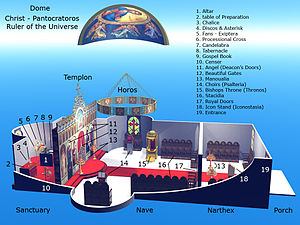Dan Wallace has done a post at his new blog that’s getting a lot of buzz:
But with the birth of Protestantism there necessarily came a rift within the western church. By ‘necessarily’ I mean that Protestants made it necessary by splitting from Rome.
I’m not clear on why he says Protestants made the split necessary. The usual argument is that Rome made the split necessary. Rome forced the issue by her impenitant moral and theological corruption.
Jaroslav Pelikan had it right when he said that the Reformation was a tragic necessity.
Why is that tragic? Christ founded a church, not a denomination. The Protestant Reformers simply broke with a preexisting denomination. The Roman church is merely a Western European denomination. A local church that gained undue influence through power politics, which became (and remains) morally and theologically corrupt.
Why is splitting from Rome any more tragic than splitting from the PC-USA, EPUSA, ELCA, &c.?
The church is a divine institution, but denominations are man-made. That doesn’t mean denominations are inherently evil. Just that denominations are a means to an end rather than an end in themselves. They exist to serve a function. Sometimes they outlive their usefulness. Sometimes they become counterproductive.
Consider Stephen’s contrast between the temple and the tabernacle (Acts 7). The temple was fixed in time and place. Centralized. Fairly permanent.
The tabernacle was portable. Decentralized. Stephen commends a tabernacle piety over a temple piety. Travel light and keep your bags packed. Be ready to break camp and move on. Heb 11 has a similar mindset. Don’t get tied down. This is a journey, not a destination.
Spiritually speaking, should Christians live in tents or houses? Should we live like Abraham or Solomon? NT piety is nomadic. Like Jews who eat the Passover in haste, with cloak tucked into their belt, feet shod, and staff in hand, Christians should never settle down, but stay on the move.
Protestants felt truth was to be prized over unity…
That’s a false dichotomy. Shared truth is a source of unity. A bond between like-minded believers. Insofar as there is only one truth, truth and unity go together. You are one with another by believing the same truths. By living by the same truths.
You can split over perceived truth. You can disagree over what is true.
…but the follow-through was devastating. This same mindset began to infect all Protestant churches so that they continued to splinter off from each other. Today there are hundreds and hundreds of Protestant denominations. One doesn’t see this level of fracturing in either Eastern Orthodoxy or Roman Catholicism. Not even close.
That’s deeply misleading:
i) To begin with, contemporary Catholicism is a big tent. There’s what the Roman church believes on paper. Then there’s its very lax standards of church membership. In practice, Modern Catholicism is like an Arab Bazaar.
ii) Historically, both Roman Catholicism and Eastern Orthodoxy have been highly polarizing forces, by persecuting heretics. They’ve caused divisions within Christendom. They have actively spawned schismatics. They have maintained internal unity by excommunicating dissidents.
I’m not commenting on whether this is good or bad. I’m just pointing out that this type of unity can only exist by first fomenting disunity, then distancing itself from the other.
If you draw a line in the sand, there will be unity on your side of the line. But you achieve that unity by exclusion rather than inclusion. When you draw a line in the sand, that’s automatically and intentionally divisive. You instantly create insiders and outsiders. Your unity can only exist in contrast to the outsiders. Wherever you draw the line, you will have groups on either side of the line.
This can be a good thing or bad thing, depending on how and where the lines are drawn. But the resultant unity is a partial unity, within a larger disunity.
“But unity in falsehood is no unity at all,” some will protest. To a degree that is true. If the unity of the church meant that we would all deny the bodily resurrection of the theanthropic person, then that would be unity against an essential of the Christian faith. But there is no thinking Christian who agrees lock, stock, and barrel with what his pastor teaches. Yet, he is a part of that church. In this respect, he has prized unity over truth. We all have to do this. If we didn’t, each Christian would be his or her own church. The fellowship would be awfully predictable and quite boring!
But that’s true for Catholics, Orthodox, and Protestants alike. For instance, many Catholics and Orthodox are members in good standing, even though they are nominal members. They don’t agree with everything their denomination represents.
Several evangelical scholars have noted that the problem with Protestant ecclesiology is that there is no Protestant ecclesiology. In many denominations—and especially in non-denominational churches—there is no hierarchy of churches responsible to a central head, no accountability beyond the local congregation, no fellowship beyond the local assembly, no missional emphasis that gains support from hundreds of congregations, and no superiors to whom a local pastor must submit for doctrinal or ethical fidelity.
There are several obvious problems with a hierarchical accountability system:



